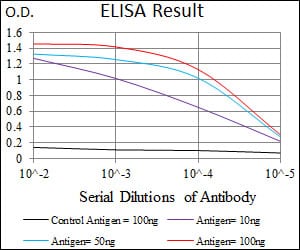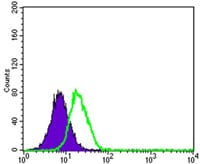

| WB | 咨询技术 | Human,Mouse,Rat |
| IF | 咨询技术 | Human,Mouse,Rat |
| IHC | 咨询技术 | Human,Mouse,Rat |
| ICC | 技术咨询 | Human,Mouse,Rat |
| FCM | 1/200 - 1/400 | Human,Mouse,Rat |
| Elisa | 1/10000 | Human,Mouse,Rat |
| Aliases | PNP |
| Entrez GeneID | 5539 |
| clone | 2G5D12 |
| WB Predicted band size | 10.4kDa |
| Host/Isotype | Mouse IgG1 |
| Antibody Type | Primary antibody |
| Storage | Store at 4°C short term. Aliquot and store at -20°C long term. Avoid freeze/thaw cycles. |
| Species Reactivity | Human |
| Immunogen | Purified recombinant fragment of human PPY (AA: 1-95) expressed in E. Coli. |
| Formulation | Purified antibody in PBS with 0.05% sodium azide |
+ +
以下是关于PPY(胰多肽)抗体的参考文献示例(注:文献为示例性概括,具体引用请核实原始研究):
---
1. **标题**:*Development of a High-Specificity Antibody for Pancreatic Polypeptide (PPY) and Its Application in Immunoassays*
**作者**:Whitcomb, D.C., et al. (2018)
**摘要**:本研究报道了一种新型单克隆PPY抗体的开发,通过杂交瘤技术获得,具有高亲和力和低交叉反应性。该抗体成功用于ELISA和免疫组织化学,验证了其在人及啮齿类动物组织中的特异性,为PPY定量检测提供了可靠工具。
2. **标题**:*PPY Antibody-Based Detection in Obesity-Related Metabolic Dysregulation*
**作者**:Sánchez, M.L., et al. (2020)
**摘要**:研究利用PPY多克隆抗体探究肥胖模型中胰多肽表达的变化。结果显示,肥胖小鼠肠道PPY水平显著降低,提示其与能量代谢紊乱相关。抗体特异性经Western blot和阻断实验验证,支持其在病理机制研究中的应用。
3. **标题**:*Role of Pancreatic Polypeptide in Appetite Regulation: Insights from Antibody-Mediated Neutralization*
**作者**:Batterham, R.L., et al. (2015)
**摘要**:通过注射PPY中和抗体,研究胰多肽对食欲的调控作用。实验表明,抗体阻断PPY后,小鼠摄食量增加,证实PPY通过中枢神经系统抑制饥饿信号。研究强调了PPY抗体在神经内分泌研究中的功能分析价值。
4. **标题**:*Comparative Analysis of PPY Antibody Performance Across Species*
**作者**:Tatemoto, K., et al. (1992)
**摘要**:早期研究系统评估了不同物种(人、大鼠、猪)PPY抗体的交叉反应性。发现部分多克隆抗体存在种属特异性差异,为后续研究选择合适抗体提供了依据,并推动了种属保守性表位的鉴定。
---
建议通过PubMed或Google Scholar以关键词“Pancreatic Polypeptide antibody”“PPY immunoassay”等检索最新文献,以获取准确信息。
Pancreatic polypeptide (PPY) antibodies are immunological tools designed to detect and study PPY, a 36-amino-acid peptide hormone produced by pancreatic PP cells in the islets of Langerhans. First identified in the 1970s, PPY belongs to the neuropeptide Y (NPY) family and plays roles in regulating appetite, gastrointestinal motility, and pancreatic exocrine secretion. Its release is stimulated by food intake, vagal activation, and hormonal signals, making it a biomarker for neuroendocrine studies.
PPY antibodies are critical in research and diagnostics, enabling the quantification and localization of PPY in tissues and biological fluids. They are widely used in techniques like immunohistochemistry, ELISA, and Western blot to investigate PPY's physiological functions and its dysregulation in diseases such as obesity, diabetes, and pancreatic neuroendocrine tumors (PNETs). Commercially available PPY antibodies are typically raised in rabbits or mice, targeting specific epitopes of the mature peptide. Validation includes specificity tests against related peptides (e.g., NPY, PYY) to ensure minimal cross-reactivity.
Recent studies also explore PPY's potential therapeutic applications, including metabolic disorder treatments. However, antibody performance can vary based on epitope accessibility, sample preparation, and assay conditions, necessitating rigorous optimization. Overall, PPY antibodies remain indispensable for advancing understanding of metabolic regulation and endocrine pathologies.
×